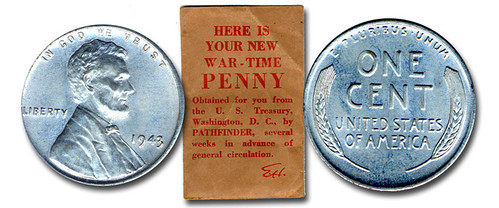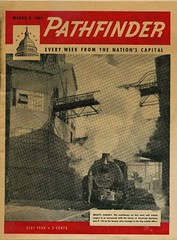
PREV ARTICLE
NEXT ARTICLE
FULL ISSUE
PREV FULL ISSUE
A FIRST-RELEASE 1943 STEEL CENT ENVELOPE
Numismatic ephemera is not only a neat collectible, but a great source of information. In his November 4, 2015 Stack's Bowers blog
post, Frank Van Valen describes a recent purchase relating to the 1943 steel cent. -Editor

A recent trip to one of my favorite internet auction services produced a 1943 steel cent in Mint State. Though it is not a rare item by any stretch of the imagination, the coin I now own is housed in a faintly tattered manila paper envelope which reads: “HERE IS / YOUR NEW / WAR-TIME / PENNY / Obtained for you from / the U.S. Treasury, / Washington, D.C., by / PATHFINDER, several / weeks in advance of / general circulation” on 10 lines in red ink. It is machine signed “E.H.” in fancy script. This is the first one of these I have ever seen in 50+ years of collecting, and I immediately purchased it for well under $10. The leading third-party grading services churn out “First Release” and “Early Release” slabs at every turn whenever a new issue is minted. I can’t help but wonder whether I could get this Mint State 1943 “steelie” in a “First Release” holder from one of the grading services? After all, it is a bona-fide early release!
I've never seen one of these envelopes before. By definition, such items are ephemeral in nature - used once for an initial purpose,
then quickly discarded by nearly everyone. How many remain? Have any of our readers seen one of these before? Those envelopes are far
more rare than the coins they accompany, and could well be far more rare than the famous off-metal versions, the 1943 copper cent or the
1944 steel cent.
So who was E.H.? And what was PATHFINDER? Guessing that it might have been a publication, I found an entry in the Encyclopedia Britannica stating that "Time magazine’s immediate forerunner was the Pathfinder (1894–1954), a weekly rewriting of the news for rural readers."  I found several offerings of the magazine on eBay. Here's an image of a 1944 issue, where the cover touts it as publishing "Every
Week From The Nation's Capital". A column titled "The Week at Home" contains articles headlined "Sugar Supply Cut" and
"Fuel Shortage". All of that ties in with the theme of the Steel Cent envelope, but doesn't prove a connection. I found several offerings of the magazine on eBay. Here's an image of a 1944 issue, where the cover touts it as publishing "Every
Week From The Nation's Capital". A column titled "The Week at Home" contains articles headlined "Sugar Supply Cut" and
"Fuel Shortage". All of that ties in with the theme of the Steel Cent envelope, but doesn't prove a connection.
Perhaps an article or ad could be found in an earlier issue outlining the offer of a new cent for readers. Or perhaps they were just given away as souvenirs, and there was no documentary evidence. So we may never know for sure. But a great piece of numismatic ephemera regardless, and one that should be preserved and documented for future collectors and researchers. I also reached out to one of our favorite old-timers, Harvey Stack, to see what he remembers. -Editor Harvey Stack writes: It has been so many years gone back when I encountered presentation envelopes for the 1943 Cent. I do not know if these were privately made. or actually issued by banks or the Mint to acquaint receivers of the new steel metal used. I remember seeing small groups of these at one time, and they were possibly packaged by the Mint for visitors to pay 1 cent or maybe 5 Cents each as a souvenir. I remember seeing similar envelopes (with and without coins in them) as the Mint introduced the 'silver' nickel, and drew to the receiver's attention that these were marked on the reverse with large letters "P, D or S" designating they had silver in the coin. I also remember, about that time, and years later, that one would find small bags of cents, ie Ten Cents, issued by the mint, also as a souvenir and if I remember correctly they were sold at 10 cents or 20 cents a sack, also at the Mint. In 1942 the Mint issued 5 piece and 6 piece Proof sets, and also sold Cents and Five Cents of each separately, at a very small premium to be used in the Lincoln Head Cent Sets and Jefferson Nickel sets. Also, in 1942 they sold the entire set, in proof, consisting of one cent, both Five cents, a Dime, Quarter, and Half Dollar (the Five Cent, Dime, Quarter and Half Dollar were SILVER) for $2.10. (a small premium above face !!!) Today, the Mint is much more profitable, they sell All their products at substantial high premiums, most are mounted in special cards, boxes and booklets, to make them look rare and desirable and the profit they make is many times face value. So in the earlier days, the Mint made inexpensive Souvenirs; today they are more in the market for promotional items at the cost of the collectors. To read the complete article, see:
To read the Encyclopedia Britannica article, see:
To read the complete eBay lot description, see:

Wayne Homren, Editor The Numismatic Bibliomania Society is a non-profit organization promoting numismatic literature. See our web site at coinbooks.org. To submit items for publication in The E-Sylum, write to the Editor at this address: whomren@gmail.com To subscribe go to: https://my.binhost.com/lists/listinfo/esylum All Rights Reserved. NBS Home Page Contact the NBS webmaster 
|